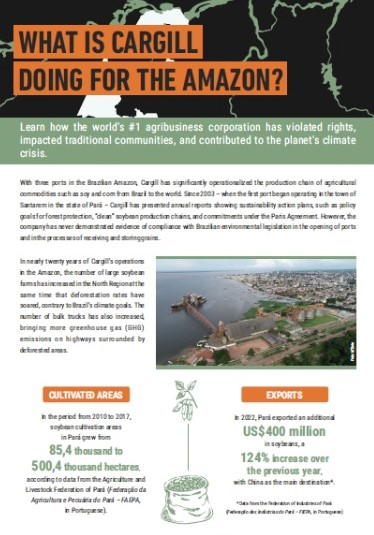What is Cargill doing for the Amazon?
Learn how the world's #1 agribusiness corporation has violated rights, impacted traditional communities and contributed to the planet's climate crisis.
 With three ports in the Brazilian Amazon, Cargill has significantly operationalized the production chain of agricultural commodities such as soy and corn from Brazil to the world. Since 2003 – when the first port began operating in the town of Santarem in the state of Pará – Cargill has presented annual reports showing sustainability action plans, such as policy goals for forest protection, “clean” soybean production chains, and commitments under the Paris Agreement. However, the company has never demonstrated evidence of compliance with Brazilian environmental legislation in the opening of ports and in the processes of receiving and storing grains.
With three ports in the Brazilian Amazon, Cargill has significantly operationalized the production chain of agricultural commodities such as soy and corn from Brazil to the world. Since 2003 – when the first port began operating in the town of Santarem in the state of Pará – Cargill has presented annual reports showing sustainability action plans, such as policy goals for forest protection, “clean” soybean production chains, and commitments under the Paris Agreement. However, the company has never demonstrated evidence of compliance with Brazilian environmental legislation in the opening of ports and in the processes of receiving and storing grains.
In nearly twenty years of Cargill's operations in the Amazon, the number of large soybean farms has increased in the North Region at the
same time that deforestation rates have soared, contrary to Brazil's climate goals. The number of bulk trucks has also increased, bringing more greenhouse gas (GHG) emissions on highways surrounded by deforested areas.
Ações: Empresas e Violações dos Direitos Humanos
Eixos: Terra, território e justiça espacial


